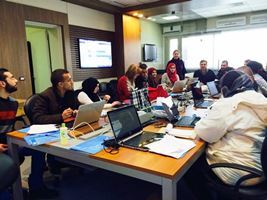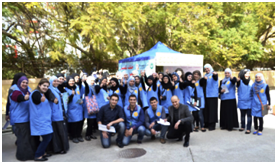WHO initiates an online disease reporting system: DHIS2
In order to strengthen the Epidemiology Surveillance Unit (ESU) at the Ministry of Public Health (MoPH), WHO initiated a  During the DHIS2 training in the Emergency Operations Centre at Rafic Hariri University Hospitalproject to build an online disease reporting system, using DHIS2 web application. A two weeks workshop from 10 to 21 February 2015 was conducted for 28 participants from ESU unit, in order to optimize the DHIS2 to match the Ministry of Public Health ESU needs.
During the DHIS2 training in the Emergency Operations Centre at Rafic Hariri University Hospitalproject to build an online disease reporting system, using DHIS2 web application. A two weeks workshop from 10 to 21 February 2015 was conducted for 28 participants from ESU unit, in order to optimize the DHIS2 to match the Ministry of Public Health ESU needs.
By customizing the validation rules, indicators and reports. At the end of the workshop a site visit was made to the MOPH Qada health unit office in Saida, The customization should be tested and ready to use by mid of March 2015. The initial set up of DHIS2 was initiated in September 2014, where the ESU staff was trained and the project entered a pilot phase, including three centres, the MoPH office in Beirut, the Emergency Operation Centre at Rafic Hariri University Hospital and the MoPH office in Tripoli Mohafaza.
World Health Day 2014
 Beirut, Lebanon, 7 April 2014 – On World Health Day 2014, WHO Lebanon not only celebrated the anniversary of the founding of the World Health Organization but also drew Lebanon’s attention to a subject of great importance for national public health: vector-borne diseases. The slogan for this year’s campaign is “Small bite: big threat” and aims to raise awareness of the threat posed by vectors and vector-borne diseases and encourage families and communities to take action to protect themselves.
Beirut, Lebanon, 7 April 2014 – On World Health Day 2014, WHO Lebanon not only celebrated the anniversary of the founding of the World Health Organization but also drew Lebanon’s attention to a subject of great importance for national public health: vector-borne diseases. The slogan for this year’s campaign is “Small bite: big threat” and aims to raise awareness of the threat posed by vectors and vector-borne diseases and encourage families and communities to take action to protect themselves.
Vectors are small organisms that carry diseases and spread them from person to person and place to place. They can put our health at risk, at home and when we travel. Malaria, dengue and leishmaniasis are all transmitted by vectors. Dengue and malaria are especially dangerous, since they can cause serious illness and can cause death. They are transmitted by mosquitoes. Leishmaniasis is a disease that is caused by sandflies. It disfigures people who are infected, and this often results in social stigmatization and exclusion.
Within the past two decades, many important vector-borne diseases have also re-emerged or spread to new parts of the world. Environmental changes, a massive increase in international travel and trade, changes in agricultural practices and rapid unplanned urbanization are causing an increase in the number and spread of many vectors worldwide and making new groups of people, notably tourists and business travellers, vulnerable.
This also applies to Lebanon that has witnessed the re-introduction of several vectors to the country, notably sandflies causing several cases of leishmaniasis among the displaced Syrians in the country.
WHO emphasizes the importance of cooperation between different sectors to combat vectors. The Ministries of Public Health, Agriculture, and Municipalities, as well as local communities, need to work together to implement an integrated approach to the management of vectors, with the support of WHO. WHO Lebanon will technically and financially support the Lebanese University project to establish the Lebanese Vectors Atlas illustrating the geographical distribution of different diseases vectors in all Lebanese provinces.
Let the World Health Day this day reinforce the efforts to combat the threat of vector borne diseases in Lebanon, “No one in the 21st century should die from the bite of a mosquito, a sandfly, a blackfly or a tick,” says Dr Margaret Chan, WHO Director-General.
Toward smoke-free universities in Saida
 8 July 2014 – With the support of WHO Lebanon and the Ministry of Public Health, “Al Riaya” institution with “Wa Baaden” team launched a project “toward smoke-free universities” in 12 universities in Saida.
8 July 2014 – With the support of WHO Lebanon and the Ministry of Public Health, “Al Riaya” institution with “Wa Baaden” team launched a project “toward smoke-free universities” in 12 universities in Saida.
The Lebanese University and the University of Saint Joseph were among the participating universities.
Tents were set in the participating universities where the team members explained the objectives of the smoke-free competition and provided information to the students on smoking harm. Five universities were declared “smoke-free” at the end of the project.


